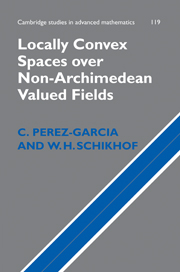Book contents
- Frontmatter
- Contents
- Preface
- 1 Ultrametrics and valuations
- 2 Normed spaces
- 3 Locally convex spaces
- 4 The Hahn–Banach Theorem
- 5 The weak topology
- 6 C-compactness
- 7 Barrelledness and reflexivity
- 8 Montel and nuclear spaces
- 9 Spaces with an “orthogonal” base
- 10 Tensor products
- 11 Inductive limits
- Appendix A Glossary of terms
- Appendix B Guide to the examples
- Notation
- References
- Index
11 - Inductive limits
Published online by Cambridge University Press: 06 July 2010
- Frontmatter
- Contents
- Preface
- 1 Ultrametrics and valuations
- 2 Normed spaces
- 3 Locally convex spaces
- 4 The Hahn–Banach Theorem
- 5 The weak topology
- 6 C-compactness
- 7 Barrelledness and reflexivity
- 8 Montel and nuclear spaces
- 9 Spaces with an “orthogonal” base
- 10 Tensor products
- 11 Inductive limits
- Appendix A Glossary of terms
- Appendix B Guide to the examples
- Notation
- References
- Index
Summary
Locally convex inductive limits over the real and complex field appear in great abundance in many disciplines of classical analysis and its applications, see [29] for a background account. It is our impression that their non-Archimedean counterparts will play a similar role, see the chapter notes for some supporting evidence on this.
Inductive limits have popped in occasionally in previous chapters, often accompanied by promises to discuss some delicate matters later on. Now that we have the necessary locally convex theory available, we are able to develop some framework on inductive limits, thereby keeping our word.
After recalling the definition of an inductive limit we describe the general form of its continuous seminorms (11.1.1) and zero neighbourhoods (11.1.2). By using basically classical methods we derive results on strictness and regularity, e.g. that every strict inductive sequence of Fréchet spaces is regular (11.1.7). This is followed by a typically non-Archimedean discussion (11.1.8) on weak forms of regularity and strictness. Grothendieck's result saying that a Hausdorff (LF)-space is regular if and only if each bounded set is contained in a Banach disk, is translated without too much effort to the non-Archimedean case (11.1.11). We conclude Section 11.1 with a description of the dual of an inductive sequence being a projective system (11.1.13) and with a few examples (11.1.15).
Stability properties are the main concern of Section 11.2. After recalling results obtained previously in the book (11.2.1) we prove in a modified classical way that the Hausdorff property (11.2.2) and metrizability (11.2.8) are not stable under taking inductive limits.
Information
- Type
- Chapter
- Information
- Locally Convex Spaces over Non-Archimedean Valued Fields , pp. 409 - 441Publisher: Cambridge University PressPrint publication year: 2010
